Hungry for help: refugees in Kenya feel the effects of recent food cuts
KAKUMA REFUGEE CAMP, Kenya, January 9 (UNHCR) – Nyachot squints up at the midday sun above Kakuma Camp as she stirs the daily meal for her family. Before last November, the 34-year-old South Sudanese refugee could cook twice a day. But when the World Food Programme cut rations by 50 per cent that month, she feared for her children’s future.
“The food does not even last the two weeks that it should,” Nyachot told UNHCR visitors, turning to gaze at her baby son. Like thousands of other women at this camp in north-west Kenya, she relies completely on the rations she receives, in the absence of any other source of income. Full rations were later resumed on January 1, but the situation remains serious and fresh funding is needed to avert the risk of further cuts in the future.
Nyachot fled South Sudan in February last year, after fighting intensified between government forces and rebels. Desperate to save her children, she embarked upon an arduous weeklong journey that took her from her home in Maiwat, Upper Nile state to Nadapal, the border entry point to Kenya.
Her eyes filled with tears as she recalled the trauma. “I travelled by boat with about 40 other people for five long days to Juba and then took a bus from there to Nadapal,” she said. “My children were hungry and thirsty.”
When they finally arrived in Nadapal, UNHCR officials and other humanitarian agencies were there to greet them with energy biscuits and water. Later, at Kakuma’s reception centre, they received hot meals, sleeping bags and a place to sleep, before being transferred to Kakuma 4, the new settlement area for South Sudanese arrivals.
For Nyachot, finding refuge in Kakuma and receiving food assistance was a huge relief. Non-food items, such as blankets, cooking utensils, an energy stove and jerry cans, were also supplied and helped her family settle into their new home. But with the food ration cuts in November, Nyachot’s concern quickly began to grow.
In one of the nearby mud houses, Stephen and Gawar shared similar worries. They fled Pangak in South Sudan’s Jonglei state and, like Nyachot, sought refuge in Kakuma. “The situation is very bad,” observed Stephen, interviewed before full rations were resumed last week. “We eat once a day and the food can get finished after five days. Some of our people are even thinking of going back home. It is not an ideal solution, but people are desperate.”
Nyagai, their 36-year-old neighbour, concurred. “Once the rations run out, I survive by begging for food from my neighbours,” she says. “It is a shame to do so but what option do I have?”
Her friend, Nyapel, smiled sadly when she revealed that she could not breastfeed her 11-month-old son due to a medical condition. “I have to sell part of my meagre rations so as to buy milk for him. If I don’t this, then my son will not survive.”
After the ration cuts took effect in November, concerted efforts were made by World Food Programme to raise additional funding and restore full rations – and this was possible at the start of the month. But the funding situation remains uncertain and WFP and UNHCR have issued joint appeals to donors for help.
Meanwhile, UNHCR and partner NGOs continued to engage with refugees through their community leaders to assure them of continued support during November and December. These efforts were a result of the recent joint Inter-Agency Regional Appeal for the South Sudan Emergency Response.
Although refugees had been assured that this was a temporary situation, they remain concerned. “If the food cuts continue, many people will suffer, especially the elderly, the women and children,” said Gawar. Stephen believed that their hope lies with UNHCR.
As she turned back to her cooking, a glimmer of hope flickered in Nyachot’s eyes. She, at least, believed that things would get better; if not for her then at least for her children.
Page 14 of 18
-
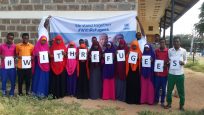
Pomp and Colour Mark World Refugee Day Celebrations in Dadaab
23 Jun 2017“Kenya and UNHCR have been like our parents for the last 26 years. We continue to request donors and other well-wishers to continue funding Dadaab so that we can continue to receive vital services like maternal and child healthcare.”
-
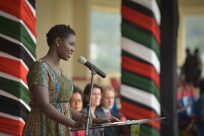
Kenya marks World Refugee Day 2017
21 Jun 2017“We honour the resilience and courage of more than 65 million people who have been forced to flee war, persecution and violence. But it’s also a moment to recognise those communities and people around the world who receive refugees and the internally displaced in their midst, offering them a safe place, and welcoming them in their schools, their workplaces and their societies.”
-
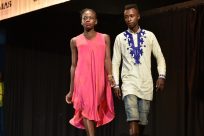
UNHCR Kicks-off World Refugee Day Activities with a Debate on Refugee Contribution to the Local Economy
15 Jun 2017NAIROBI, Kenya – As the world prepares to mark World Refugee Day on 20 June 2017, the UN Refugee Agency, UNHCR Kenya has started hosting events and activities. World Refugee Day is an opportunity to remember that there are over 65 million refugees and displaced persons around the world, who are […]
-
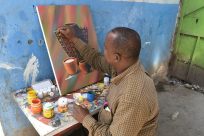
Somali refugee uses his artistic skills to earn a living
13 Jun 2017“Art feeds me. This is my hobby, it is my life. I have nothing else.”
-
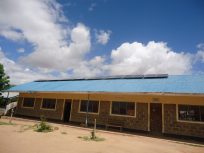
Solar Energy Boosts Learning in Refugee Camp
5 Jun 2017‘The learners feel safe to come to study at night. Without this project, it would be impossible for this to happen’
-
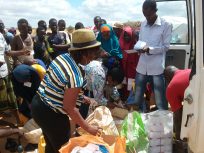
Church Charity Group Donates to Flood Victims
29 May 2017UNHCR estimates that nearly US$40,000 worth of assistance is needed to deal with the effects of the flooding.
-
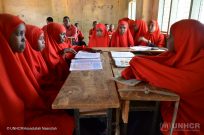
Refugee Teacher Scales Heights to Global Stage
26 May 2017“One of my students went on to Princeton, one of the top Ivy League schools in the US, for his undergraduate degree, then to Germany where he completed his postgraduate degree. He is now pursuing his doctorate.”
-
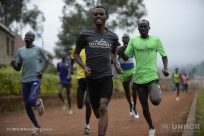
Ethiopian Athlete From Kakuma Refugee Camp Finds Hope in Running
24 May 2017“Running is my passion, it is something I really love to do and it is a way of life to me. It gives me hope and hope is life.”
-

International Day against Homophobia and Transphobia
17 May 2017“Being gay is not a challenge. I was born like that. I left my family in my home country and created a new family with the LGBTI community here”
-

UNHCR Brings Services Closer to Refugees Through Innovation
11 May 2017The toll free number, 0800720063, is expected to improve Individual Case Management (ICM), identify and fast-track vulnerable cases, reduce costs associated with accessing UNHCR such as transport and the time spent trying to gain access to UNHCR services.
